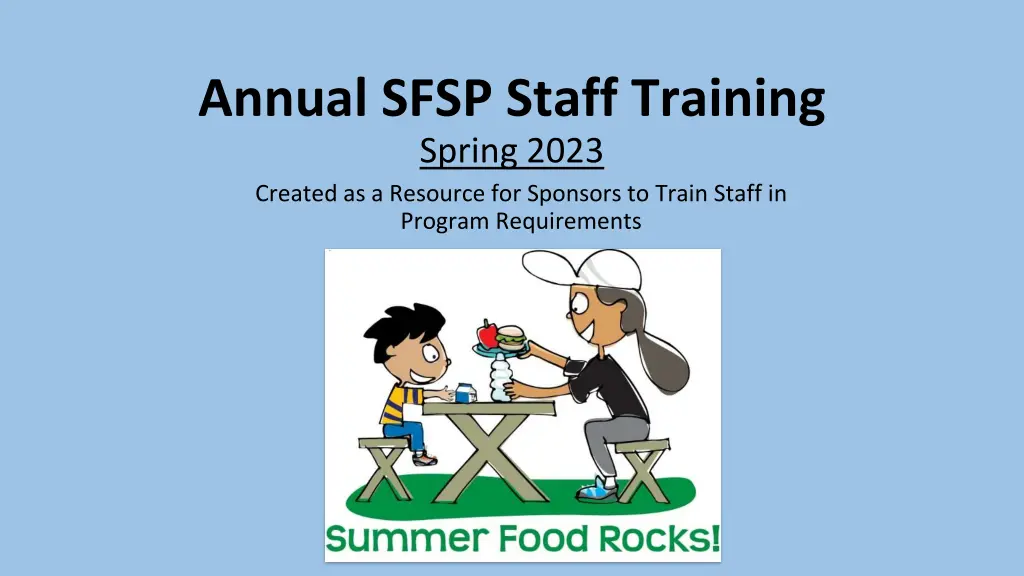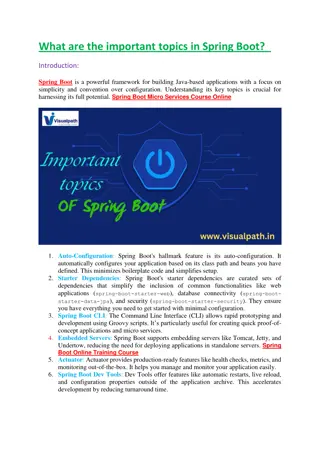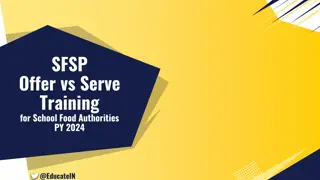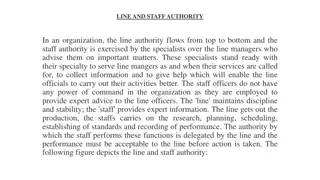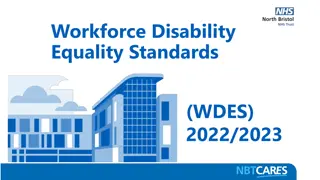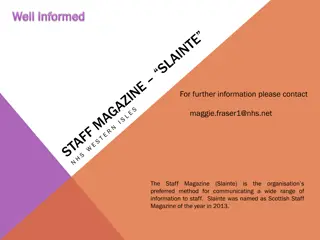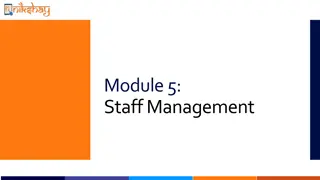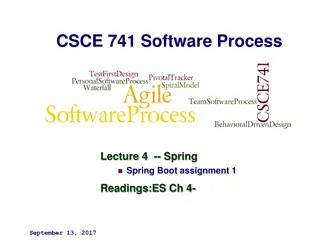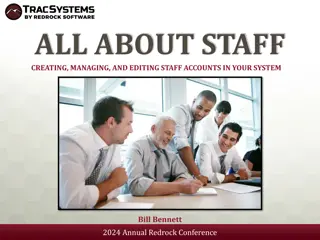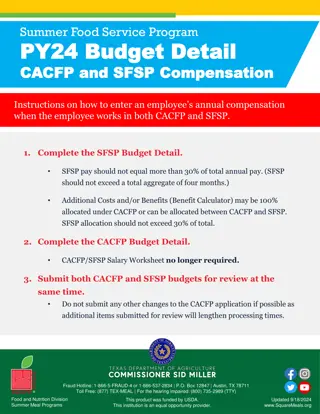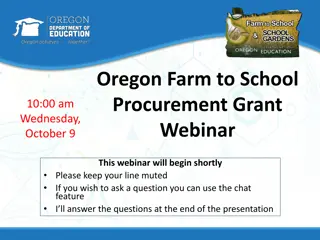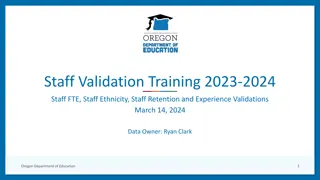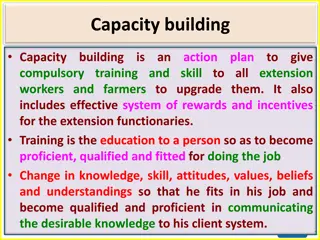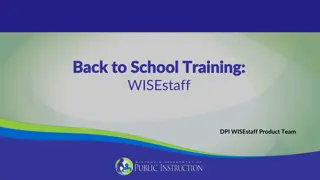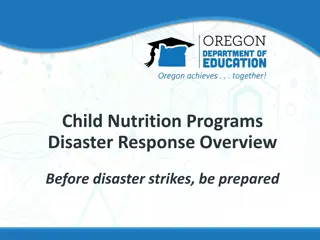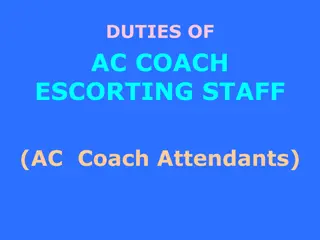Spring 2023 SFSP Staff Training Resource
Access the ultimate training guide for Spring 2023 SFSP staff. Enhance understanding of program requirements to ensure compliance. Popular
Download Presentation

Please find below an Image/Link to download the presentation.
The content on the website is provided AS IS for your information and personal use only. It may not be sold, licensed, or shared on other websites without obtaining consent from the author. Download presentation by click this link. If you encounter any issues during the download, it is possible that the publisher has removed the file from their server.
E N D
Presentation Transcript
Annual SFSP Staff Training Spring 2023 Created as a Resource for Sponsors to Train Staff in Program Requirements
ATTENTION SFSP SPONSOR! IDOE Disclaimer Please note that this training tool is not an all-encompassing resource that covers every single aspect of SFSP operations in detail. Instead, this tool is provided as a sample staff training document. When training your staff and volunteers make sure all aspects critical to your specific sponsorship are addressed to help ensure compliance and success at each site. NOTE! While training mentions non-congregate sites, it does not cover detailed training for non-congregate meal service for sponsors that have been approved for this option. Rural sponsors approved for home delivery or parent pick up must train their staff prior to the start of program operations using other resources.
Training includes three separate sessions: 1. Site Staff 2. Site Supervisors 3. Site Monitors* Different sessions are divided by the color of slides. When the color changes, you can dismiss some of the attendees based on their job duties and training needs. *Monitors should stay for the entire training. Site Supervisors should stay for the first 2 sessions.
Preliminaries Please make sure to sign in on the sponsor training sign-in page. If you have any questions, do not hesitate to ask! All SFSP employees are required to be trained in program requirements annually.
SFSP- What is it? SFSP = Summer Food Service Program The SFSP is funded by the USDA (United States Department of Agriculture) All rules and regulations are federal (national) requirements The SFSP is locally administered by the Indiana Department of Education
SFSP Purpose SFSP IS A program to provide nutritional meals to underprivileged children during times when school is not in session SFSP is NOT A program to feed adults Designed to provide children with all food that they need in a day A program for children to take food home to eat at a later time
USDA Funds the program. Creates the rules for the program. Oversees the IDOE administration of program. IDOE Approves sponsoring organizations as well as new sites. Trains sponsors on program regulations. Monitors sponsors for compliance. Conducts SFSP Administrative Reviews according to USDA requirements. Our Local Sponsoring Agency Provides free meals that meet meal pattern requirements. Ensures daily compliance with all USDA regulations. Spends federal funds to provide nutritious meals to children 18 and under. Feeds children at approved meal service sites during approved mealtimes. Self-monitors to ensure continued compliance at each site.
Site Selection Sites are located in approved meal service areas. Sites may not be moved to a new location without prior approval from the Indiana Department of Education. Site locations should be chosen with accessibility in mind and located where children can gather safely and easily.
Site Rules Meals are only available to children 18 and younger. If older, the child must be enrolled as a student in a K-12 school. Persons with disabilities who are over the age of 18 must be enrolled in the local K-12 school to receive meals. (For reference, students with mental disabilities often graduate around the age of 21 or 22.) Pregnant women over the age of 18 do not qualify for a free meal. Small children who are not eating solid foods (younger than 6 months) or who are too young to eat the food provided should not be served a meal.
Program Adult vs. Non-Program Adult Program Adult- An employee or volunteer who has a job duty specific to SFSP. For example, a monitor watching to ensure kids stay on site, a meal counter, a custodian with program related duties, kitchen staff. Non-Program Adult- A person over the age of 18 who does not have a specific job duty within the SFSP. This can include employees or volunteers who do not work with the meal service operation. For example, parents who bring their kids to the site, daycare staff who bring children to your site, YMCA counselors who do not help with SFSP in any way, custodians who do not work in the cafeteria.
Program Adult vs. Non-Program Adult Meals SFSP Sponsors may (but are not required to) provide program adults one meal free of charge. This is considered an allowable expense. These meals are marked on the daily meal count form in the appropriate section but not claimed for reimbursement! Non-Program adult meals must be either purchased or provided funding from an outside source. It is recommended that all adult meals be eaten on site to avoid confusion among children about what foods may be taken off site. Some sites solicit donations from community partners in order to serve non-program adults free of charge. Each sponsor must set a non-program adult meal price and ensure that the meals are counted and the money for the meals is deposited into the SFSP account.
Site Rules Meals must be served within the approved meal service time. Prior approval must be given by the IDOE before serving meals at the new time, if a change is necessary. It is best to keep meal service time consistent throughout the summer to ensure regular attendance. Changes to the meal service must be communicated to the field specialist and may take several days to approve. All meals served outside of the approved meal service time are ineligible for reimbursement. If a household continually shows up after meal service has concluded, provide a written reminder of the meal service time.
Site Rules If a site is located outside bad weather may result in the cancellation of meal service. An inclement weather plan should be determined prior to the start of the program season and entered in the site information application in CNPweb. Discuss your alternate meal service plan in case of inclement weather with your SFSP director. Make sure all staff are trained to follow the inclement weather plan.
Share Table Will you use a share table?
Share Table Reminders If the site opts to operate a share table, items on the share table may only be consumed by children and youth age 18 and younger. A Share Table is a designated area where unopened, individually wrapped food items may be placed for participants who are still hungry. Share tables must meet all requirements as established by the local health department. Share table items should be consumed during the meal service and should not be taken home for later consumption. Do not confuse the share table items with the allowance that only one item, a grain, a fruit or a vegetable can be taken off site if it cannot be eaten during the meal service.
Share Table Reminders Only pre-packaged items may go on the share table For example: cheese sticks, goldfish cracker packages, milk cartons, juice boxes, apples, oranges, banana, packages of baby carrots, uncrustable sandwiches Items that have been opened or contaminated must be thrown away Items should be kept at food safe temperatures If milk is placed on the share table, there must be a cooler or a bowl with ice to keep the milk at a food safe temperature Share table items may be kept and put out the following day as long as they have been held a food safe temperatures Make sure that any perishable items (milk) are checked for expiration if kept more than one day
Meal Pattern Menus are planned to meet the minimum meal pattern requirements. Each Breakfast meal must include: 1 serving bread/grain cup of fruit or vegetable 8 oz of milk Each Lunch Meal must include: 2 oz of meat or meat alternate 1 serving of bread or grain cup total fruit and/or vegetable in 2 different varieties For example: cup carrots and cup of peaches 8 oz of milk Each Snack Must include 2 of the following: (pick any combination) 1 oz meat or meat alternate 1 serving of bread or grain cup of fruit or vegetable (6 oz juice) 8 oz of milk Sites must not change the planned menu without approval from the SFSP director!
Meal Pattern All children must take each planned menu item unless the site is approved to use Offer versus Serve which requires additional training and is only allowed for use by School Food Authorities. Milk is a required component of breakfast and lunch/supper and no substitution of water or juice is allowable. Fruit and vegetable are grouped into one component. You may serve 2 fruit options or 2 vegetable options or one of each at lunch, but never two items in the same form, such as apple juice and apple slices. Not all food substitutions are equal!! Before making substitutions to the planned menu, please contact the SFSP director for approval. All substitutions must be documented on the menus or production records. If any food donations are received on site, document it thoroughly, including who donated and in what quantity, and if it was handled safely.
Congregate Meals All meals must be consumed on site No off-site meal consumption is allowed.
Congregate meals must be eaten on site! As site staff, enforcement that meals must eaten on site is required. Meals must be consumed in the presence of site staff. If meal service ends at 12:30 staff should ensure all meals have been consumed and collect all trash prior to leaving the site. Meals must be consumed in the designated meal service area. If a household continually leaves the site with food in hand after being explained the site rules, site staff may decline to serve the child. Meals that are taken off site must be removed from the meal count sheet and not claimed for reimbursement.
Children must be present to receive a meal Meals can only be served to children present at the meal site. If the sponsor allows, adults can purchase meals at the set adult meal price. The money must be collected at the time of service and deposited into the program food service account. There are no exceptions to this requirement!!
Non-Congregate Meal Service Allowed only in rural areas where non-congregate sites have been pre-approved by the State Agency Meal Service Options Parent/Guardian Pick-up Option: Parents and guardians are permitted to pick up meals for children in their household. Home Delivery Option: Meals are delivered to homes. Sponsors must obtain a written Memorandum of Understanding (MOU) from all households participating in a home delivery option.
Local Program Procedures Let s take a moment to discuss our specific procedures and processes: Daily Documentation Food Safety Procedures Food Packaging Ensuring Program Integrity throughout the summer (a written Integrity Plan is required for all sponsors operating non-congregate meal service sites)
Meal Counting For meals meeting the meal pattern, each meal served will be documented on the daily meal count form. This form is to be completed as the children go through the line and marked at the point where the child receives their complete meal. The form cannot be completed before the meal or after the meal is served, it must be filled out during the meal service. One person must stand at the end of the meal service line to document the meal each child receives. To avoid miscounting, the person assigned to document the meal count should not also be plating the food.
Lets Review Meal Counting Form Each site is required to use the USDA daily meal count form or one of the IDOE pre-approved daily count forms (see SFSP webpage for approved alternatives). Pay attention to all the sections of this form!
Meal Count Form Phone number for the site, not sponsor. This should be the address of the site, not the sponsor! This is the address listed in CNPweb! Meal Type is required for claiming! Site name is important!! This and the address can be pre-filled for ease of use. 2023 The site supervisor for the day must be listed. This person must be trained in Site Supervisor Responsibilities! A trained site supervisor must always be present! The number of meals available must be completed each day. If you claim more meals than the number here, the extra meals will be disallowed by IDOE. Delivery time and date are important to ensure food safety!!
Only first meals served to children are counted here. Meals must be counted individually. No lines through all the numbers, no circle of the final number- each meal must be counted individually! Meal Count Form The total number of meals served must be included and match the number of individual meal count marks!
Meal Count Form Totals matching the meal counts must be listed. Individual meal counting is still required. And these must be complete meals, not only one component or leftovers. Total all meals served and left over meals and add to get the number of meals available for the day. This total should be the number of meals you listed as available for the day!!!
Meal Count Form Record here if you served all available meals prior to the end of the meal service time and there are additional children requesting a meal. Count the total number of kids up to the end of the approved meal service time. 6/14/2023 Signature and Date are REQUIRED. The form should be signed by the person counting meals on the day of meal service. The person counting meals should not sign to site supervisor s name in this line, they should sign their name on the line. The sponsor may require the site supervisor to also sign off of the meal count form if they desire.
Meal Count Form Meals will be disallowed by the IDOE if meal count records are not complete, including: Meals are not counted individually: one line through many numbers or one mark on the final meal count Missing required information such as total number of meals available or missing signature More meals were claimed than the number of meals available Exact meal counts repeat daily with no variation
Meal Counting Questions? This is a very important aspect of our program, so please make sure you understand all the requirements and ask questions!
Food Safety It is extremely important that food is kept at food safe temperatures during the hot summer months. Sites may utilize Time or Temperature Control Whether using time or temperature to control bacteria growth, documentation must be kept to ensure proof of food safe practices. In the event of a food borne illness outbreak, the health department will ask to see all documentation that proper food safety controls were put into place for Summer Food Service Program operation
Food Safety Time as a control: When using time control, food may be taken out of temperature holding (hot or cold) for up to 4 hours prior to service. Once the 4 hour time limit has been reached, all food items must be discarded. When using this method, sites must document what time food was taken out of temperature control and what time the items were discarded. Keep in mind if opting to utilize this method, children are more likely to eat food items kept at their ideal temperature. Kids don t like warm milk!!
Food Safety Temperature as a control: When utilizing temperature as a control, sites must document that food is maintained at proper temperature for the item being served Cold items: below 41 degrees Hot items: 135 degrees or above Proper equipment must be in place-- steam tables or chafing dishes for hot items and coolers and ice packs or cold tables for cold items Sites must document the receiving temperature as well as hot or cold holding temperatures for all items being served A temperature log is required, and thermometers must be used at the site level to document proper holding temperatures.
Food Safety Hairnets and gloves must be worn by servers serving open food items for example: serving green beans out of a pan - If all meal items are packaged and placed into bags in the central kitchen and site staff only hand out a bag and milk carton, the requirement may not be applicable, depending upon local health department requirements. - Be mindful of surroundings- if the wind is blowing grass or leaves into the meal service area, shield food items from the debris so it does not contaminate your food items
Daily Site Reminders Meal service area should be inspected daily, free from debris, and safe for children Greet children with a smile and How are you today? All meals served must contain all the required food items Count meals individually as children go through the line Clean up the meal service area and throw away all trash Ensure children have enough time to finish eating before leaving the site. Upon leaving a site, all meals should be eaten and trash thrown away. If in doubt how to handle local scenarios, ask your site supervisor!
Questions? Any questions about meal service or general program compliance?
Civil Rights Civil Rights seeks to ensure that all program participants are treated fairly and that benefits are equally accessible to all children Discrimination occurs when a person or groups of people are treated unequally. Discrimination may be intentional or unintentional The protected classes in child nutrition programs: Race, Color, National Origin, Age, Sex (including gender identity and sexual orientation), and Disability You may not treat someone differently if they are a member of one of the protected classes
Civil Rights Civil Rights Laws require: Equal treatment for everyone Equal access to all programs and activities Elimination of barriers that prevent or deter people from receiving benefits Dignity and respect for all Ensure that discrimination, prejudice and stereotyping do not exist Knowledge of both rights and responsibilities
Civil Rights Who is responsible for Civil Rights compliance? Is civil Rights training required annually for all staff and program volunteers? YES!
Civil Rights Non-discrimination statements must be included on all materials sent to households in reference to any child nutrition program. Contact your SFSP director for the correct statement to be included on program materials. Before sending out any flyers or informational papers, ensure that the non-discrimination statement is attached! Camp Sponsors: The statement should be included on any application sent to households!
Civil Rights Do you have a need to communicate in a language other than English? If so, please ensure that all program materials are provided in all languages necessary to fully communicate with your participating families. The IDOE has no And Justice For All flyers for distribution at this time.
Civil Rights The And Justice for All poster must be visible to program participants at every meal service site! Utilize the full 11x17 inch size posters A part of the Civil Rights compliance requirement is completing the Racial/Ethnic Data form It must be collected annually by sponsor staff for each site
Civil Rights Complaints It is a basic right for individuals to file a civil rights complaint at any time. Complaints may be given verbally or written Complaints may be given anonymously Complaints may be filed at any time up to 6 months after the incident has occurred Complaints must be logged correctly and reported to either the USDA office of Civil Rights or to the Indiana Department of Education
Civil Rights Information to be collected when receiving a civil rights complaint: Who: Contact Information of Complainant What: Description of Incident(s) When: Date of the Incident Where: Location(s) of Occurrence Who Else: Possible Witnesses Then, contact your SFSP director!
Civil Rights Everyone has a responsibility to ensure all people are treated equally and with good manners Civil Rights complaints are to be taken seriously All complaints must be reported to the USDA It is not up to you to determine whether the complaint is valid; simply record and report the complaint as it is told to you
Civil Rights Meal Substitutions Meal substitutions must be made for students with an allergy or disability A substitution that can be made within the meal pattern does not require a note by a medical authority For example: A child states that they are lactose intolerant and you have soy milk available. No doctor s note is required, but you may request one at the local level to make sure you provide the most appropriate substitution Substitutions made with a doctor s note may follow what the documentation says and substitutions are allowable outside of the meal pattern For example: The allergy note states the child is allergic to milk and soy, so juice should be substituted at lunch. If the note is signed by someone with prescriptive authority, you may make the meal pattern change. Keep the doctor s note available for review by State Agency reviewers. This documentation may be kept in the sponsor s central office.
Site Supervisor Training All site staff who will not be site supervisors or monitors may be dismissed at this time.
Site Supervisor What is your role? To ensure that compliance is met daily for each meal that you supervise. Serve meals to all children who come to your site. Provide excellent customer service to the families that you serve. A trained site supervisor must be present during meal service (observing actual meal service the entire meal period) each day
Site Supervisor Responsibilities Ensure each meal served is reimbursable Maintain meal count documentation Maintain meal pattern compliance documentation Maintain delivery receipts as needed Communicate with Sponsor about meal delivery changes Ensure food safety Ensure civil rights compliance Inform your SFSP director of the need for a change in meal service time or meal type Submit all appropriate to the central office each week Keep your site safe and clean
